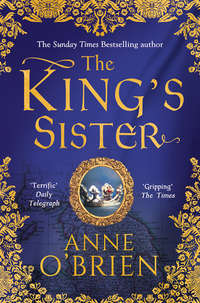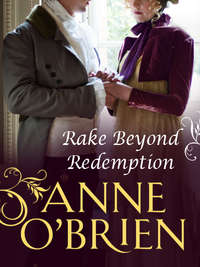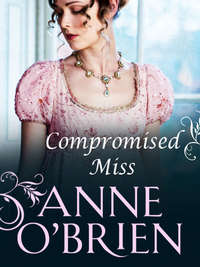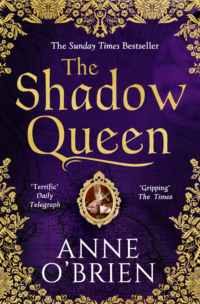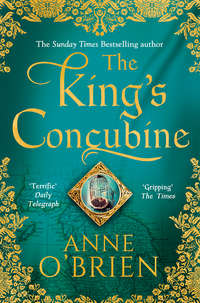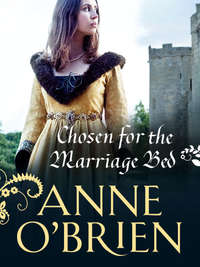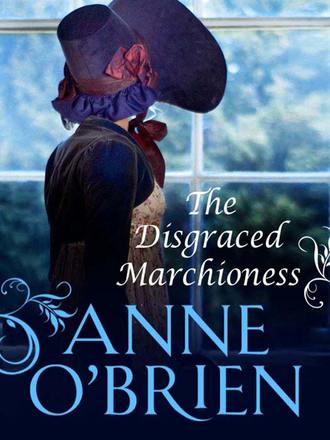
Полная версия
The Disgraced Marchioness
Hal snorted. ‘Very efficient! I will leave all such matters to you.’
Nicholas was silent for a moment as they reined in their horses to take in the fine view of the lower lake with its ornamental planting. Then he fixed his brother with a determined eye.
‘Hal. I know that you can tell me it is none of my affair—but is anything wrong?’
‘How do you mean?’ Henry betrayed nothing by glance or voice. ‘I am aware of nothing. Apart from having to share the breakfast table with Alicia Stamford and her interminable opinions on every topic under the sun. She is enough to make a saint swear—and I am no saint!’
Nick grimaced in sympathy, but refused to be put off.
‘I don’t know what it is, but between you and Eleanor I sense unease, some distance between you. More than that, in fact—a definite lack of … of tolerance.’
‘How so?’ Hal’s expression became even more bland.
‘I don’t know.’ Nicholas rubbed his chin with his gloved fist. ‘It is nothing that you say or do. Just that—you don’t seem to like each other very much. And you seem to have deliberately kept out of her way—and she out of yours.’
Henry kept his gaze fixed on the landscape, lifting his shoulders in the lightest of shrugs. ‘I was not aware. Perhaps Lady Burford is just wary of men, after Thomas’s death.’
‘There, you see. You are all cold formality, using her title. And I had not thought that she was wary. Nell is usually approachable and friendly enough.’
Henry shook his head, teeth clenched. Nicholas had called her Nell! A spark of jealousy gripped him before he could curse himself for a fool. Such suspicions were totally unfounded as he knew very well. And what was it to him? The Marchioness was free to give her affections where she chose.
He deliberately turned the conversation back to the engaging topic of the merits of growing beet for the overwintering of cattle, leaving Nicholas with a clear conviction that his question had been adroitly evaded.
Henry’s relationship with Mrs Alicia Stamford, Eleanor’s ever-present mama, edged to the glacial. They were scrupulously polite to each other with no direct reference made to the circumstances of their previous encounters, when he had been regarded by her as a most unsatisfactory suitor to her beautiful daughter. The rules were clearly laid down between them during their first meeting after Henry’s arrival.
‘Lord Henry. We are pleased to see you back in England.’ Mrs Stamford forced her lips into the semblance of a smile and inclined her head with condescending grace, as she smoothed her satin skirts and arranged the costly and delicate shawl round her shoulders in more becoming folds. She had been a beautiful woman in her youth, shadows of it still there in the rich auburn of her hair and her elegant figure. But advanced hypochondria and a fierce ambition dedicated to ensuring the social advancement of her daughter had taken its toll. Her once-porcelain skin was now finely lined, her complexion sallow. Her husband, a country gentleman of comfortable means but no social pretensions, had been dead some dozen years. The lady was now intent on enjoying her freedom and elevated status as mother to the Marchioness of Burford, secure in the knowledge that she lived at one of the best addresses in town and had the means to trick herself out in the latest fashions.
‘Thank you, ma’am.’ Lord Henry raised her cold fingers to his lips with impeccable finesse. ‘I see that you remember me.’
‘Of course, my lord.’ A flush stained her thin features. ‘I remember making your acquaintance in London during my daughter’s first Season.’
‘But our acquaintance, as I recall, was of very short duration.’ Since you did everything in your power to keep Eleanor out of my path!
‘You were very keen to seek your fortune in America, my lord, as I recall. I trust that matters went well for you.’
‘They did.’
‘And how long do you plan to remain here at Burford Hall?’ A matter of days, I sincerely trust!
‘I have not yet decided.’
‘I am sure the estate can manage well enough without your involvement, if business demands your presence elsewhere.’ Her lips curled unpleasantly that he might be engaged in something so common as business, no matter how lucrative. ‘Nicholas has proved himself an excellent trustee for my grandson. And Mr Hoskins, of course.’
‘I am sure he has. But it my inclination to remain here for a little while.’
Which was about as much as they could find to say to each other. Henry smiled and bowed. Mrs Stamford inclined her head once more. They understood each other very well.
And Nicholas, with half an ear to the exchange, was left with the uneasy impression that there was something here which he had missed, of which he was unaware. Conversation with Nell’s mama was always an adventure, bordering on the brittle. Opinionated, critical, frequently acerbic and intolerant, she took no prisoners. But here … Nick could not quite put his finger on it. The sneer on Mrs Stamford’s face, the edge to her voice as the exchange drew to a close could have cut through flesh and bone. And as for Hal … There was no love lost here, despite the exquisite politeness of the little episode. But short of asking either combatant outright … One glance at the closed expressions, the barely veiled hostility, convinced Nick that no man of sense or with an eye to self-preservation would risk such a foolhardy move.
In spite of Nell’s determination to keep her mind on more important issues, her thoughts betrayed her with cruel persistence. And her dreams. She relived again and again that magical Season when her mother and an aged uncle had launched her into society, the only season which was possible, given their financial circumstances. Her mother had been intent on a good match, as advantageous a marriage as could be achieved. Once she had met Lord Henry Faringdon, Eleanor had thoughts for no one else.
It was at a soirée, at the home of a distant cousin who mixed in the most fashionable of circles, an ideal opportunity for Eleanor to meet the privileged members of the haut ton. Her mother had managed to pull strings to achieve invitations. Eleanor could remember the occasion in perfect detail when she dared allow her mind free rein. Sitting in her bedroom with her son on her lap, she abandoned her attempts to discipline her memories and simply let them sweep back unhindered, layer upon layer. The decorations of hothouse flowers with the intense perfume of jasmine and heliotrope. The music and dancing. And the dress she wore for the occasion. White muslin as would become a débutante with a delicately embroidered hem and silver ribbons at waist and neckline. Her hair in high-pinned ringlets, falling to her shoulders, and a string of pearls, the only jewellery she possessed.
And she had seen him that night. He had entered the room with his brother, the Marquis, but Eleanor had eyes for no one but Lord Henry. The Marquis, for all his consequence and good looks, might not have existed. Lord Henry filled her vision and her senses. Tall, dark of hair, handsome of face, elegant of figure, impossibly attractive in the formal splendid of black satin evening clothes and white linen. They were introduced. They stood up for a country dance. And her heart was lost before she could take a breath, somewhere between the cotillion and a reel.
Her smile was wry, a little sad, as she recalled that heady moment. The merest touch of his hand had quickened her pulse and when his lips had brushed her fingers she knew that she was his for ever.
Disastrously, she was now forced to admit, Eleanor had believed that he was as captivated as she. What a fool she had been! Carried away by the romance of snatched meetings, the delicious duplicity of a few stolen moments of time when they could close out the world. She had listened to his dreams of a new life, fired by his ideas and ambitions. She had believed in him. Trusted. They would go together.
And then he had simply left her with not one word of explanation or farewell. Humiliated and heartbroken, she had hidden her grief, determined not to be an object of interest or pity. Her pride and her spirit had come to her aid when she might have been totally devastated, and she had survived. With the kindness and compassion of Thomas. Dear Thomas. But she had learned in those cold days after Lord Henry’s departure that there was a high price to pay for love and she would not willingly pay it again. To show emotion, to offer love, was to put yourself into the power of those to whom it was given. And when it was not returned …
Eleanor shuddered as she remembered the exact occasion of her open avowal of love and commitment to Hal, when a soft moon illuminated the summer house, casting deep and intimate shadows within, painting the leaves of the overhanging willow that enclosed them with silver hue.
When Thomas had offered marriage, her gratitude knew no bounds. She could not love him—he both knew and accepted that. She had never tried to dissemble or pretend to an emotion that was now beyond her capabilities. Deep affection, yes, without doubt. And trust. But love … that was not possible. And he in his turn had offered her friendship, kindness, respect, a marriage based on compassion and understanding. No promises of blazing passion. But she could—indeed, wished to—live without that, and had done so comfortably for two whole years. Why was love considered necessary to achieve a satisfying marriage? When Thomas had taken her to his bed and made her truly his wife he had possessed her with such grace and sensitivity, with a depth of care and tenderness that she still felt she did not deserve. He had quite determinedly allowed no room for either discomfort or embarrassment on her part, enfolding her in warmth and a gentle humour. Her heart swelled, tears threatened as she recalled those painful early days when Thomas had set himself to comfort and reassure. And she, in recognition of her debt to him, had set herself to be a good wife and mother, equally determined that Thomas should never fault her or regret the decision that he had made that desperate day when she had visited him at Faringdon House in London to cast herself on his mercy.
Eleanor, allowing her gaze to rest for a long moment on the miniature of Thomas which stood on her nightstand, believed in all honesty that she had kept her bargain and would mourn her husband’s death with genuine grief for the loss of the dearest of friends.
All passion in her life was dead.
If only Hal had not touched her beyond a formal gesture of greeting. If only he had not kissed her, held her in his arms. And she had responded, encouraged him. And wanted him. She felt the heat rise in her cheeks as her senses relived the moment.
Eleanor straightened her shoulders and lectured herself with stern words. Lord Henry must never be given the opportunity to reawaken the passion. It would—it must—remain dead and buried. He must never know what she had suffered for his rejection. For the future, she would tolerate her mother’s well-meaning interference and devote her life to raising her beloved son. She would find enjoyment and fulfilment in that. She dashed the tears from her cheeks with an impatient hand. Of course she would. She buried her face in her son’s dark curls.
On a parallel course, though both would have denied it, Henry, too, found his thoughts returning far too often for comfort to those days when he had met and loved Miss Eleanor Stamford. His courtship of her had been carried on under the most difficult of circumstances, not least the suspicious glare of her mother who desired a far better marriage for her beautiful daughter. Lord Henry, although his birth might be impeccable, was a loose cannon with a desire to make his own way in the world and an uncomfortable lack of consideration for social standing and protocol. Mrs Stamford had watched him like a mother hawk, intent on defending her chick. But he and Eleanor had found the means to meet and the memories were bittersweet.
By God, he had loved her! And believed beyond doubt that she had loved him. Enough to disobey her exacting parent and travel to the new world where they would marry and make a life not bound by rigid convention. He had sworn his undying love, sweeping her along with his dreams of the future. Made preparations. Sent to tell her of the time and place of their sailing. And waited in vain on the windswept dock as the Captain made ready to sail.
No message. No note. Nothing. The minutes had ticked by, his idealistic hopes fading with every beat of his heart, yet still trying to believe that she would arrive at the eleventh hour. And then he could pretend no more. They needed to catch the tide and he had sailed alone. He had risked one further letter when he had landed, but received nothing in return.
So Mr Henry Faringdon had set himself to building his future alone, finding the time to curse Eleanor and all women for their capricious and inconstant nature. Without doubt, she had enjoyed the romance and the excitement of his wooing, been flattered by his declaration of love, but had no intention of keeping her own promises.
Perhaps she had enjoyed the power of having him at her feet. Henry grimaced at his youthful naïvety, his black brows snapping into a firm line. Very well. He too had learnt a hard lesson and would not in his lifetime forget the painful wounds. And it would not be something that he would put himself in the way of repeating.
Thus in his dealings with women since, trust and loyalty were never an issue. Definitely not love! He kept a mistress in some comfort and enjoyed her many talents, but it was a casual arrangement, both sides enjoying the benefits but recognising the lack of commitment.
He now smiled at the thought of her accommodating bed and welcoming arms. Rosalind gave him the pleasures of light conversation, feminine company and the soft delights of her body, with no demands on his time or emotions other than those he was prepared to give. He gave her financial security—and presumably some passing pleasure. But on that windswept dock as the England’s Glory prepared to sail from Liverpool to New York, he had vowed that he would never again give his heart and soul to any woman.
He might marry in future, of course. But he saw it as a business transaction only to achieve an heir. He would never allow memories of Eleanor Stamford to cloud his judgement or unsettle his peace of mind.
Now, back at Burford Hall, where he must see his nemesis every day, Henry closed his mind against the image of the girl who had stolen his heart, against remembering the soft seductiveness of her lips against his, her delectable curves as he drew her close to imprint her body with his own. And he found a need to discover any excuse against spending time where she might be found in the house. But he could not prevent Nell from haunting him in his dreams with her shy smile and delicious perfume, her hair unbound in glorious disorder in his hands.
He should never have allowed himself to kiss her, to reawaken the desires and needs that now snapped at him with sharp teeth.
He set his teeth against the vivid intrusion and snarled at his valet after another restless night.
On a bright morning Lord Henry, this time alone, made a private and intensely painful visit to the church of St Mary the Virgin, which served the spiritual needs of the estate and the small village of Burford. There in the graveyard, dark head bowed, he stood beside a new grave, the turned earth still raw, although now softened with a faint sheen of spring grass. A simple plinth had been erected, its clean lines topped by a classical urn. The words and dates that recorded the life of his brother were sharply incised, all very proper and tasteful, but telling nothing of the vibrant life of the young man who lay beneath the earth in untimely death. Sorrow clawed at Henry’s heart, regrets flooded his mind. It felt, as the sun warmed his skin and the dappled shadows from the elm trees flirted playfully across the mown grass, that he had lost a part of himself, which it would never be possible to recover. With a gentle finger he traced the letters. The depths of the tearing grief that stopped his throat and stung his eyes shocked him as he damned the monstrous twist of fate that had robbed his brother of his life.
But at least Thomas had left a son, to carry on his blood line and the family name, so that there might always be a Faringdon living at Burford House. It was some comfort, Henry supposed, as he brushed the smooth curve of the urn. It must be.
As he would have turned away, his loss in no way assuaged, his attention was drawn to the fresh posy of primroses arranged at the foot of the plinth.
Eleanor’s work? Henry hoped so. His lips curved with a cynical edge as he remounted his horse, turned his back on the calm tranquillity of the dead. Whatever motives had driven Eleanor to reject his own love, to send her headlong into marriage with Thomas, he hoped that in the end she had cared for his brother more than a little.
At the beginning of the second week, the family gathered in the dining room for a late luncheon. During the first course of a range of cold cuts of meat, Lord Henry took the unusual opportunity to address himself directly to Lady Burford across the table.
‘You should know, ma’am, that I have arranged passage for America. I shall leave next week.’
‘So soon?’ Eleanor’s gaze moved from her plate to his eyes and she lifted her napkin to lips gone suddenly dry.
‘Why not?’ His face held no warmth, but perhaps a little surprise in the consternation that he read in Eleanor’s momentarily unguarded expression. ‘My business will not prosper in my absence, whereas you do not need my help here. Nick is more than capable and far more interested in developing the land than I. And Hoskins has his finger on all the legal niceties. The inheritance and your jointure are secure, ma’am. There is nothing to keep me here.’
‘Very well. I … we shall be sorry to see you go, of course.’ Her tone was low with no inflection but, to his disappointment, her gaze now quickly fell before his. She rarely allowed herself to look directly at him so that he had presumed her uninterest. And yet he realised, beyond any sort of logic, that he had been hoping that she would care. It seemed from her reply that she did not. He allowed himself a sardonic smile at his foolishness. If Eleanor had been prepared to reject his offer two years previously in the face of better prospects, she would hardly show any concern for his presence—or his absence—now.
But, on hearing Hal’s announcement, Nell’s heart had fallen to the region of her fine kid slippers, her nerves skittering like mice in an underdrawing. She did not want him to go. She was afraid of him, of her reactions to him, but she did not want him to leave Burford Hall.
Mrs Stamford took up the conversation, breaking in to her daughter’s distraught train of thought. ‘I am sure that life in America has much to entice you to return, my lord. And I expect there are friends who will be missing you.’
‘It has indeed. And, yes, there are some who will have missed me.’
Eleanor heard and came to her own conclusions. Of course. She should have realised. Her heart sank even lower, if that were possible. There was nothing to hold him in England. And there would be a lover waiting for him there, a woman who loved him and fretted for his return. A woman who was without doubt beautiful and who enjoyed the intimate attention of his mouth and hands. Her own hands clenched on her knife and fork. Of course he would wish to go back. How ridiculous to think that he would even consider her own needs. Not that she had any true idea of what they might be!
She put down the knife and fork, the slices of chicken un-tasted, her appetite suddenly gone. And began a detailed conversation with her mama with respect to a planned visit to a neighbouring family during the afternoon. Should they take the landaulet or the barouche? And what was the possibility of inclement weather?
And Hal bitterly accepted that, yes, there was nothing to keep him at Burford Hall.
The plates from the cold collation had hardly been cleared from the table and dishes of fresh fruit and cheese set out when Marcle entered to approach Lady Burford.
‘My lady. There are a lady and gentleman come here.’ He frowned his disapproval of such lax adherence to acceptable visiting hours.
Eleanor raised her brows a little in some surprise. ‘Now is not a very convenient time, Marcle. Perhaps you could show them to the red parlour and supply them with refreshment. We shall be finished here in half an hour.’
Marcle persisted, if reluctantly. ‘The gentleman apologises for the unwarranted interruption, but claims urgent business. Of a highly personal nature, which requires immediate attention from your ladyship.’
‘I see. Who is he? Do we know him?’
‘Sir Edward Baxendale, my lady.’ Marcle presented a neat visiting card on a silver salver. ‘And Miss Baxendale, his sister, I believe.’
Eleanor looked at the tasteful lettering on the card and then across the table to Nicholas, who was in deep and detailed conversation with Henry about the merits of a favourite hunter. ‘Do we know a Sir Edward Baxendale, Nicholas? Does he live locally? I think I have not heard that name, but he might be one of the hunting fraternity. In which case you will be acquainted at least.’
Nick shook his head. ‘There is no one of that name who lives in this part of the county, I am sure.’ He looked to his brother for confirmation. Henry shook his head, uninterested.
Eleanor decided. ‘Very well. Since it is an urgent matter …’ She nodded to her butler. ‘Show them in, if you please.’
Within minutes, Marcle ushered the visitors into the dining room.
‘Sir Edward Baxendale and Miss Baxendale, my lady.’
The gentleman was a man in his early thirties, perhaps a little older than Hal, of medium height and stocky build. Eleanor gained a general impression of quiet elegance and understated fashion in his clothing and appearance. He was without doubt a gentleman of some means. The lady who accompanied him was younger, slight of build, clothed in black as if recently bereaved, but again with a distinct air of fashion. Behind them came a young woman, clearly a companion or governess from her plain and serviceable dress, carrying a young child who squirmed to be set on his feet.
The gentlemen bowed. The ladies curtsied. Marcle hovered with interest in the background.
‘Well, Sir Edward. What is this personal business that cannot wait?’ Eleanor smiled to put the visitors at their ease. ‘Perhaps we can offer you a glass of wine. If you would care to sit—’
‘Forgive me, your ladyship, my lords.’ The gentleman bowed to the assembled company, face grave, politely deferential but firm. ‘I would not normally arrive on your doorstep without due notice. But this is not a social visit. Time is, I believe, of the essence. And what I have to say will certainly, I fear, be distasteful to you.’ He allowed his gaze to linger on the faces around the table, his own face and voice strained with compassion.
‘Then in what way can we be of help?’ Eleanor approached the little group, now with some concern, noting that the young woman was nervous and kept her eyes fixed on Sir Edward, as if for guidance or reassurance.
‘I fear that we are come here in some way under false pretences. This is my sister, Octavia.’ He took the hand of the young woman beside him to lead her forward. ‘She was Miss Baxendale. She is now, I must inform you, Octavia Faringdon, wife of the lately deceased Thomas Faringdon, and has been so for the past three years. She is the lawful Marchioness of Burford. And this child—’ he indicated with a glance behind him ‘—is their son, John. Heir to the title and Faringdon estates. I believe, madam, sirs, that we have much to discuss.’ Sir Edward bowed again and waited to see the impact of his declaration.
The silence that hung in the room was painful in its intensity, as enveloping as the cloud of dust motes that drifted around them in the sun’s rays.


